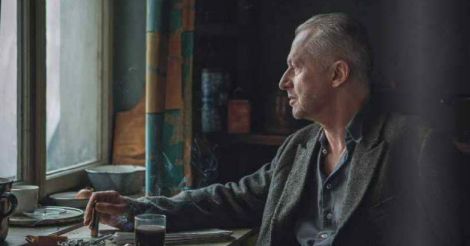Production: Akson Studio, Telewizja Polska, NINA, PISF, Tumult Foundation
Director: Andrzej Wajda
Screenwriter: Andrzej Mularczyk
Producer: Michal Kwiecinski
Cinematographer: Pawel Edelman
Editor: Grazyna Gradon
Music: Andrzej Panufnik
Venue: International Film Festival of India 2016, Panaji, Goa
The Polish film Afterimage was the opening film at the International Film Festival of India in Goa.
In his apartment, Wladyslaw Strzeminski sits holding an artist's brush, a burning cigarette between his lips, a palette full of colors on the floor and a canvas in front. As the brush is about to touch the rough canvas, a red light engulfs the entire room, turning the canvas a mere piece of the bright hue.
Outside his window, government officials are hoisting a huge red cloth banner hailing their leader – Josef Stalin. The banner prevents free flow of light into the solitary artist's room. This sequence sometimes in the beginning of the film sums up "Afterimage" - Polish master Andrzej Wajda's last film which he had completed before his demise in October this year at the age of 90.
The film narrate an oft-repeated subject - intervention of political authority into a creative person's life - but in a fresh hue. Set in early 20th century Poland, the biopic narrates how Stalinist Soviet Union and its ideas of social realism played a fatal role in the life of Strzeminski, a lifelong champion of avante-garde movement in art.
Strzeminski (Boguslaw Linda) lost an arm and a leg in World War I, but the losses never affects the energetic creative mind that he is. After leaving the army, Strzeminski became a celebrated abstract painter, teacher and a champion of modern art. Afterimage, shows him in his late 50s when he was an inspirational lecturer at the Higher School of Visual Arts in Lodz, an institution he helped to found.
Afterimage is titled after one his theories which he could not finish in his lifetime. This theory, like the other concepts of formalism in which he believes, turns out to be unacceptable to the Stalinist regime which believes that art "must meet the needs of the people."
The film vividly follows how Strzeminski's adamant stance on artistic freedom, as opposed to the rigid Stalinist restrictions, makes him an enemy of the state apparatus and leads to his inglorious exit from life after being jobless, ill and hungry.
Wajda captures in detail the personal and societal traumas that his protagonist goes through in his failed attempts to defend his convictions about art and creativity. The nonagenarian's swan song thus becomes a well-crafted piece of the contemporary history of Poland in the Soviet days.
The sequences in which the government/party supporters vandalizing the Museum of Art founded by Strzeminski and his work, though a representation of the revolt of the downtrodden against colonial oppressors, show how assaulting and vengeful autocracy can turn into.
Even as political implications of the struggle between an artist and the state machinery are focused on, the film touches on the personal life of the protagonist in a humanitarian way. Strzeminski's broken relationship with his now-ill wife and affection for his loving but struggling teenaged daughter is touchingly portrayed.
In each move and look, Linda transforms himself into the artist who is a fighter and a loser at times. The talented cast includes Bronislawa Zamachowska, Zofia Wichlacz, Krzysztof Pieczynski, Maria Semotiuk, Szymon Bobrowski and Paulina Galazka.
Pawel Edelman's camera offers painting-like frames - what you must expect in a film about an artist's life.
The tyrannies of autocracy, which comes in disguise of the good of the nation and progress of the society, on commoners' life is not a new subject for world cinema.
Much has been told about Hitler's Germany and Stalin's Soviet Union. But can we call it a cliche, when we know well that no amount of reminders about the dark times in history would be an excess.

























 A scene from the film Afterimage
A scene from the film Afterimage